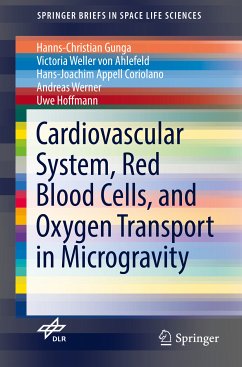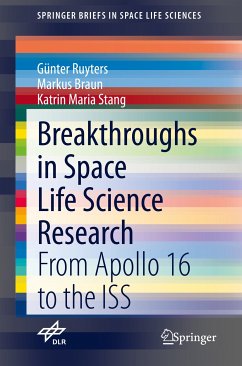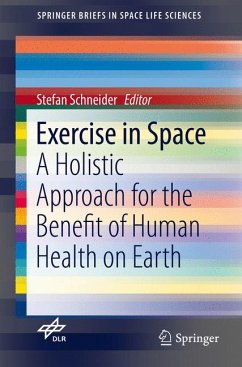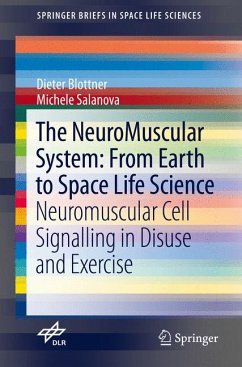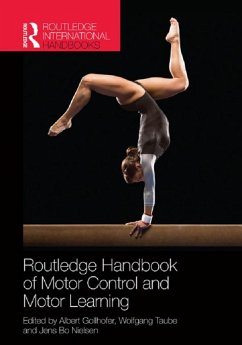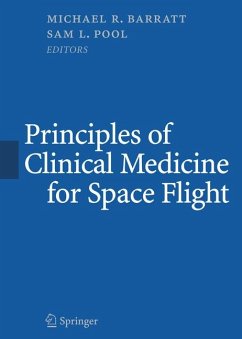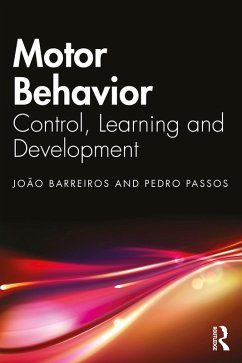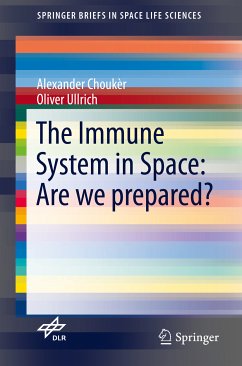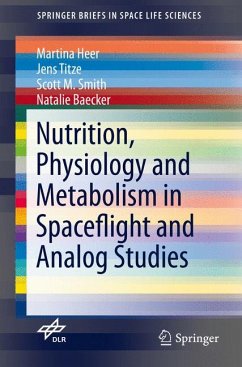
Sensory Motor and Behavioral Research in Space (eBook, PDF)

PAYBACK Punkte
20 °P sammeln!





Discusses newest findings in spatial orientation and psychomotor function
Provides insight into space research and its application for humans on earth
Translational work, written by experts in space research, psychology, zoology and sports sciences
Dieser Download kann aus rechtlichen Gründen nur mit Rechnungsadresse in A, B, BG, CY, CZ, D, DK, EW, E, FIN, F, GR, HR, H, IRL, I, LT, L, LR, M, NL, PL, P, R, S, SLO, SK ausgeliefert werden.
Reinhard Hilbig is retired professor of Zoology at the University of Hohenheim, Stuttgart, Germany. He took examination Philosophicum at the Westfäliche Wilhems University in Münster and completes his Staatsexamen and PhD at the University of Hohenheim. Reinhard Hilbig got his "venia legendi" for Zoology from the University of Hohenheim. His research was addressed to developmental neuroscience especially to the inner ear of lower vertebrates (fish) and its malformations, biomineralization, behavior and as well to spatial orientation in different gravitational environments. He had served as principal investigator in two space flight experiments and several parabolic flight and sounding rocket campaigns.
Prof. Dr. Albert Gollhofer is the director of the department of Sports and Sportscience at the Albert-Ludwigs University in Freiburg, Germany. He studied Physics and physical education in Freiburg and his research is focused on neuromuscular control and functional adaptations to training. During his scientific career at the University in Stuttgart and in Freiburg he supervised a large number of phD students in physical education. He served as a president of the European College of Sport Science and of the German Society of Biomechanics and published more than 180 international papers and several books on biomechanics, motor control and learning.
Otmar Bock is Professor of Physiology at the German Sport University in Köln. He completed his medical exam and his medical PhD thesis at the University of Hamburg, and wrote his habilitation thesis at the University of Düsseldorf where he also received his venia legendi in Biophysics.His research deals with human sesnorimotor coordination and its cognitive underpinning in healthy young persons under conditions of normal and changed gravity, as well as in healthy older adults and in neurological patients.
Dietrich Manzey is professor of Work, Engineering and Organisational Psychology at Technische Universität Berlin, Germany. He completed his Diploma and PhD in Psychology at University of Kiel, Germany, and got his habilitation from the University of Marburg, Germany. His research has addressed human performance in extreme environments, especially spaceflight. He has served as principal investigator of three spaceflight experiments investigating cognitive and psychomotor performance of astronauts. Other interests include human-automation interaction, multitasking, and cockpit display design. Dietrich has served as president of the Human Factors and Ergonomics Society (HFES) Europe Chapter, is an elected fellow of the HFES, and elected member of the International Academy of Astronautics.
Prof. Dr. Albert Gollhofer is the director of the department of Sports and Sportscience at the Albert-Ludwigs University in Freiburg, Germany. He studied Physics and physical education in Freiburg and his research is focused on neuromuscular control and functional adaptations to training. During his scientific career at the University in Stuttgart and in Freiburg he supervised a large number of phD students in physical education. He served as a president of the European College of Sport Science and of the German Society of Biomechanics and published more than 180 international papers and several books on biomechanics, motor control and learning.
Otmar Bock is Professor of Physiology at the German Sport University in Köln. He completed his medical exam and his medical PhD thesis at the University of Hamburg, and wrote his habilitation thesis at the University of Düsseldorf where he also received his venia legendi in Biophysics.His research deals with human sesnorimotor coordination and its cognitive underpinning in healthy young persons under conditions of normal and changed gravity, as well as in healthy older adults and in neurological patients.
Dietrich Manzey is professor of Work, Engineering and Organisational Psychology at Technische Universität Berlin, Germany. He completed his Diploma and PhD in Psychology at University of Kiel, Germany, and got his habilitation from the University of Marburg, Germany. His research has addressed human performance in extreme environments, especially spaceflight. He has served as principal investigator of three spaceflight experiments investigating cognitive and psychomotor performance of astronauts. Other interests include human-automation interaction, multitasking, and cockpit display design. Dietrich has served as president of the Human Factors and Ergonomics Society (HFES) Europe Chapter, is an elected fellow of the HFES, and elected member of the International Academy of Astronautics.
Produktdetails
- Verlag: Springer International Publishing
- Seitenzahl: 86
- Erscheinungstermin: 24. Oktober 2017
- Englisch
- ISBN-13: 9783319682013
- Artikelnr.: 53061775
Für dieses Produkt wurde noch keine Bewertung abgegeben. Wir würden uns sehr freuen, wenn du die erste Bewertung schreibst!
Eine Bewertung schreiben
Eine Bewertung schreiben
Andere Kunden interessierten sich für


